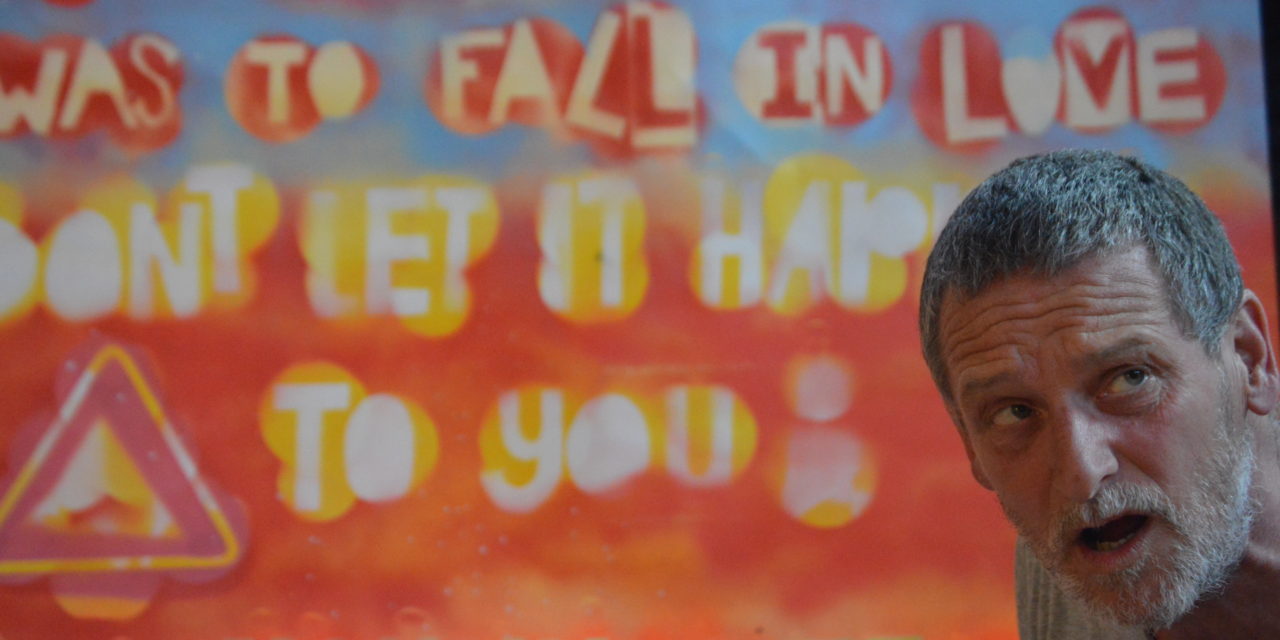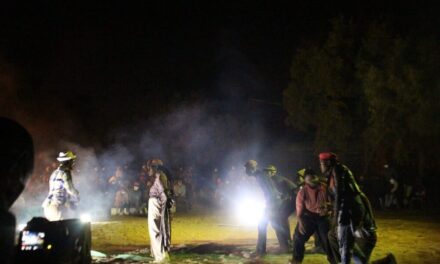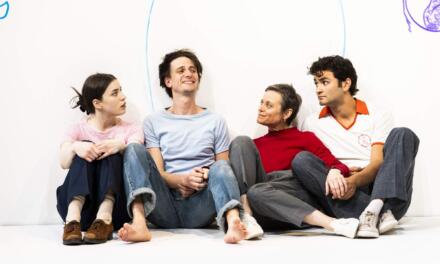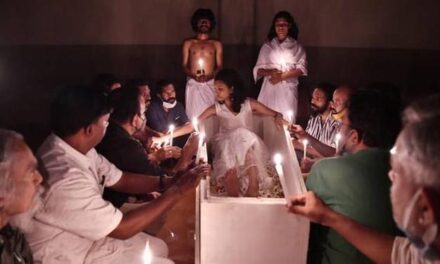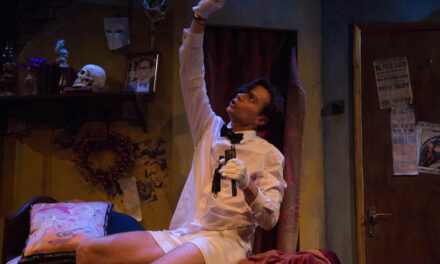A Very Queer Nazi Faust is an experimental participatory performance piece created by artist Vince Laws. It was cast via social media and originally performed at Norwich LGBT+ Pride in 2017 to great acclaim. Commissioned and supported by Unlimited, celebrating the work of disabled artists, with funding from Spirit of 2012, the performance has been developed into a happening due to be shown at Norwich Arts Centre on Wednesday, September 12, 2018. Vince Laws speaks to Colin Hambrook.
My journey as an artist began in 2004 when I first tested as HIV positive. I learned early on that making creative work is the best distraction from my health difficulties. And once I called myself a poet and artist it gave me a reason to take seriously those things I wasn’t happy with – especially issues around human rights and sexuality.
I have always been interested in mixing up mediums – and the development of A Very Queer Nazi Faust was no exception. Inspiration first came about during a very dark, long period of depression. I kept glowering, furious diaries, vomiting up exactly how shit I felt in words. I knew (hoped) I wouldn’t always feel that bad, so I wanted to write it down, capture it for future use. It evolved from a diary to random notes, which I realized no one in their right mind would want a complete novel of. I struggle to hold large concepts like a novel in my head; my concentration and memory is affected by medication. And then I realized I needed to nail the plot.
I’m very visual. I laid out 32 sheets of paper on the dining room table and used that to plot out A Very Queer Nazi Faust, because I could see all of it in one view. 32 pages – the size of a small poetry pamphlet. I automatically use drawings in my notes, so it evolved into a comic zine style.
I like the Faust stories. From the original legend based on a German alchemist who supposedly had a pact with the Devil. Goethe, Marlowe. I became curious how it might work as a 21st-century queer tale.
I decided to work my own artwork into the comic and it slowly turned into the story of poet John Faust protesting his own death. His benefits have been stopped without warning, the bailiffs are due to evict him, his dog is in the vets dying, his car needs a new clutch, and he can’t finish his poetic masterpiece while the voices inside his head torment him.
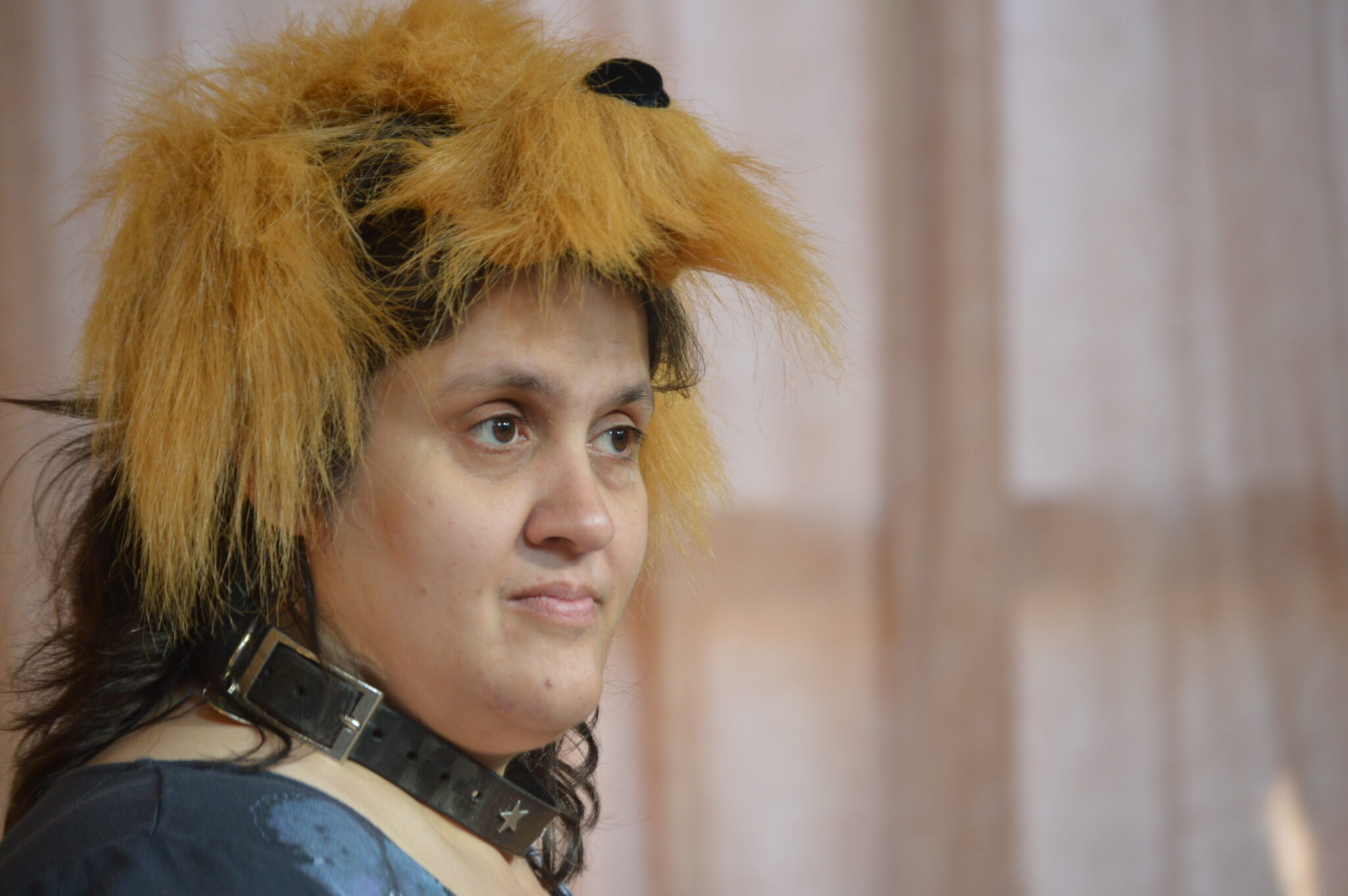
Dolly Sen as Nelson the dog |Photo Credits Ann Nicholls
In despair, he throws himself off Beeston Bump, Norfolk’s highest peak, clutching “The Tragic True Life & Deserved Death of a Benefit Scrounger by Himself,” but Lucifer won’t let John drown because she loves his work and wants a bigger part in it.
I like to create “Happenings.” I’ve been putting on events for many years; getting lots of people to a venue and attaching it to a cause – like face-painting the names of countries where it’s illegal to be gay onto a group of participants, and adding in poetry, singing, dance, whatever skills people have offered, programming the performance so it’s constantly interesting, not too much of any one thing. As a story began to emerge, so I started to think I could have a Happening with a fuller narrative.
As it came together it all fitted into my plan to protest the slaughter of sick and disabled people under the present British Government, but essentially, I’m not sure what A Very Queer Nazi Faust is, and I like that. Theatre Director Simon Floyd, who has been supporting the show’s development, described it as performance art, produced from the most surreal script he’d ever read.
Nazi was a word I thought of, discarded, but then went back to. I read a piece about the Nazi T4 program, which was the first mass murder program aimed at disabled children and then adults – as they were potentially the biggest burden on the state if they lived a long life.
I accept some could argue that it’s othering, i.e. taking the blame away from the British Government, and Britain has committed plenty of atrocities, opening the first concentration camps during the 2nd Boer War, where 250,000 people died, mainly women and children, in horrific conditions.
In my piece the context comes through when Faust repeats, “but Lucifer, there aren’t any Nazis in it…” but the backdrop of Department of Work and Pensions shrouds, the denouncement of the UK Tory government, makes it clear if unspoken that we are living under a form of hard right idealism.
I knew it was a provocative title. I like that. Some people have been worried about it. Norwich Pride wouldn’t print the title in their program and yet allowed me to stage it at their event. Norwich Arts Centre love the title and has no problem. Some participants early on worried about the title. They became outraged in support of me when it was censored without explanation.
It’s been a good journey for a lot of the creative people involved in the project. Andrew Day the film-maker has been filming rehearsals and when we get past the point of the performance will edit a film from the shots he has. He’s starting to understand the art side of what he’s making, more. He has cerebral palsy so it is difficult to hear his speech – so we have inserted speech bubbles for his own part in it. He’s also making a standalone film of the text.
Other creatives are pushing the boundaries of what they do. Dandelion Snowley is creating a soundscape. She’s a singer, songwriter, performer, and musician and she is going to make a podcast from her sound recordings of the piece – so it is making her think about being creative in a different way. She usually generates her own material, so working with someone else’s text and putting a radio play together is something new for her.
I wanted A Very Queer Nazi Faust to be light enough to take on tour easily. The work has come about from a book, so I came up with the simple idea of using fabric to create a series of giant pages. Recycled sheets and duvets have been hemmed by volunteers, then I’ve spray painted them with text, creating 6 x 4-foot shrouds, which make up the backdrop.
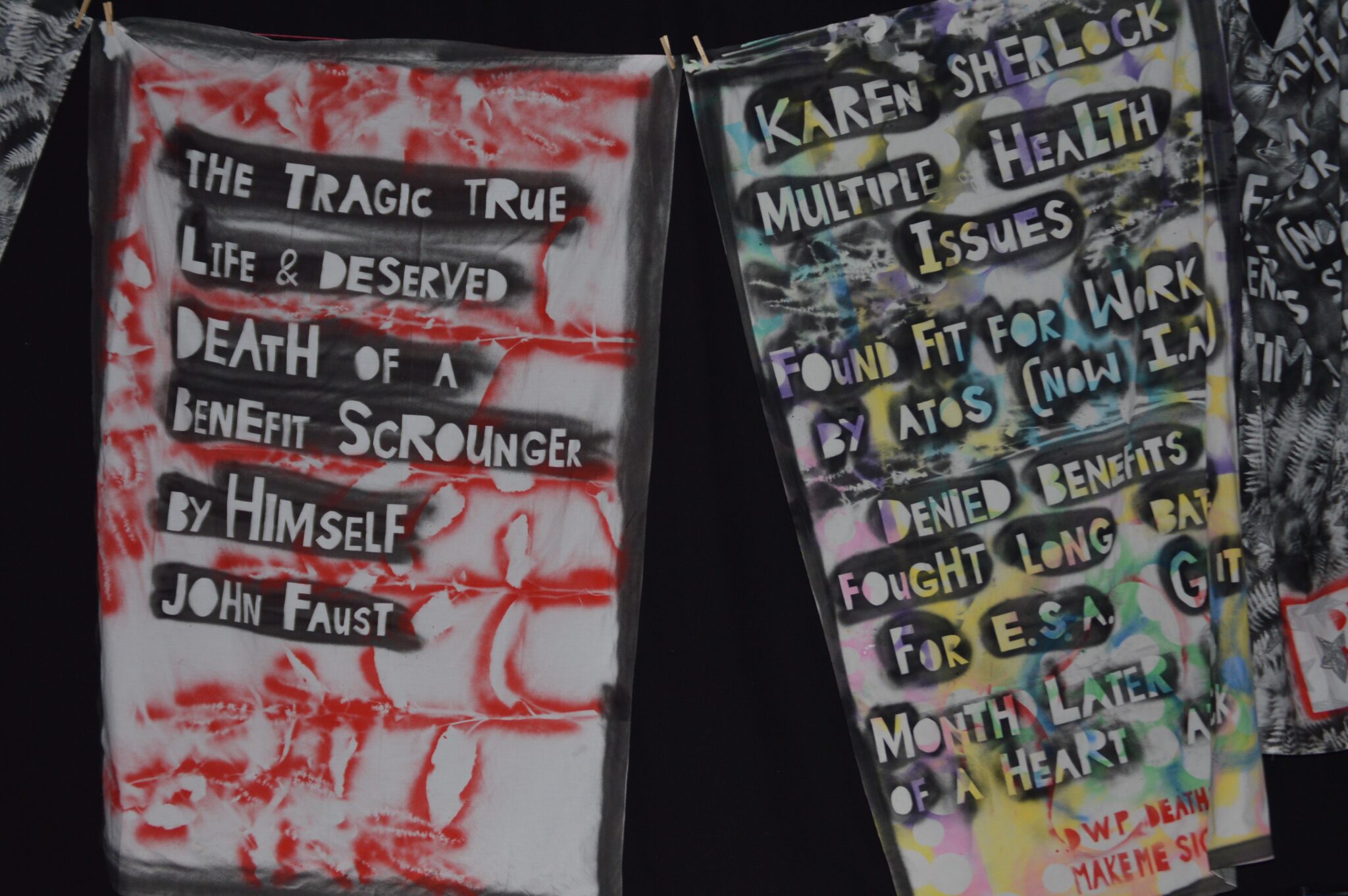
Shrouds hanging at Norwich Arts Centre |Photo Credits Ann Nicholls
There are two giant ears on each side of the stage, and two giant eyeballs just above the performers’ heads – to give a sense of the action taking place inside John Faust’s head. The whole piece has a strong visual element to it. I’m using washing lines and pegs to hang the shrouds, a hint to government “dirty laundry,” as each shroud names an individual disabled victim of austerity and the circumstances of their death. As the show progresses so the number of shrouds hung across and up the sides of the stage and out into the auditorium increases.
We have talked about touring it with a core number of people – although at the moment the practicality of taking 13 disabled performers on the road will require more thought…and funding. There are lots of possibilities for ways in which A Very Queer Nazi Faust could be taken on the road.
The story could be performed with just the two main characters, Faust and Lucifer, speaking over the soundscape, or we could play Andrew’s text film of the work alongside dancers or musicians performing on stage. I am open to all possibilities.
Celebrating the lives of disabled people and the diversity of our community, A Very Queer Nazi Faust goes to Norwich Arts Centre on Wednesday, September 12. Ticket prices £6.66 (including an admin fee).
This post was written by the author in their personal capacity.The opinions expressed in this article are the author’s own and do not reflect the view of The Theatre Times, their staff or collaborators.
This post was written by Colin Hambrook.
The views expressed here belong to the author and do not necessarily reflect our views and opinions.

